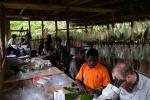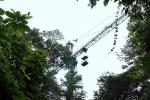Hunting for insects with a crane: forest ecology research on six continents will be spearheaded by the Czech Academy of Sciences
How would forests entirely devoid of insects look like? And why most of insect species prefer life in tropical jungles to temperate zone forests? Questions asked by a curious child, perhaps, but also by international research team from the Czech Academy of Sciences, recently supported by the European Research Council to study forests all over the world, and build a new canopy crane in the rainforests of Papua New Guinea.
The European Research Council has awarded EUR 3.35 million “advanced” grant to Vojtech Novotny’s team at the Biology Centre of the Czech Academy of Sciences for the study of insects and their impact on forest vegetation. This research will build a global network of stud sites in the Czech Republic, Japan, USA, Ghana, Panama and Papua New Guinea, in collaboration with the Smithsonian Institution, the Universities of South Bohemia, Minnesota, and Chiba, as well as local partners at each of the study sites.
Herbivorous insects can become pests in commercially planted forests, but their impact on natural mixed forests may be more subtle. Insect herbivores may modify the species composition of forests as each of them attacks its own favoured host plants. At the same time forests are dangerous places teeming with predatory ants, parasitoid wasps, and insatiable birds and bats, all hunting for herbivores and thus indirectly benefitting plants. These interactions can be complicated, particularly in tropical forests where as many as 500 species of woody plants may be attacked by 10 thousand species of insects. We need to study these complex ecosystems in order to understand also the simplified forests found in the temperate zone.
Classical studies using a butterfly net are nowadays complemented by ecological experiments, conducted in the forest canopies. The tree crowns can be accessed by canopy crane, a standard construction crane erected in the middle of the forest. Instead of bricks it is hauling ecologists into the tree crowns. There are nine such research cranes working in the world’s forests; the Novotny’s team is planning to built one more, in so far crane-less Papua New Guinea. The new crane will be based at the New Guinea Binatang Research Center, one of the prominent ecological research centers in the country.
The new project builds on the existing Center for Tropical Biology, further expanding its diverse team of researchers and students from 12 countries, and making Ceske Budejovice a prominent center of tropical ecology research. And the importance of this research for everyday life? „This study is not about pest control or other direct economic benefits, our ambitions are bigger – we want to understand the complex biological world around us and hope that when people read about our findings, it will feel like an intellectual adventure for them“, says Vojtech Novotny.

















